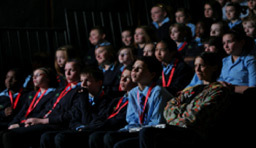 Earlier this year I went as a reporter to cover Julie Walters’ return to her
hometown of Smethwick, where she was talking to schoolchildren as part of the FILMCLUB charity’s Close Encounters programme. The town where Oswald
Mosley was MP, and where Malcolm X once came to challenge racist election campaigning, remains a place struggling with deprivation and poverty. However what I saw in that room, organised by
teachers and pupils in their spare time, was the power of a simple idea: to use film to improve aspiration and educational achievement. Walters shared experiences of her difficult grammar school
days, her career change (from nursing) and most importantly the idea of ambition and hard work. Growing up watching working class film heroes like Tom Courtenay and Michael Caine inspired her.
Earlier this year I went as a reporter to cover Julie Walters’ return to her
hometown of Smethwick, where she was talking to schoolchildren as part of the FILMCLUB charity’s Close Encounters programme. The town where Oswald
Mosley was MP, and where Malcolm X once came to challenge racist election campaigning, remains a place struggling with deprivation and poverty. However what I saw in that room, organised by
teachers and pupils in their spare time, was the power of a simple idea: to use film to improve aspiration and educational achievement. Walters shared experiences of her difficult grammar school
days, her career change (from nursing) and most importantly the idea of ambition and hard work. Growing up watching working class film heroes like Tom Courtenay and Michael Caine inspired her.
As a result of what I saw I’ve just become a trustee of the charity.
Set up just 4 years ago as a pilot in 25 schools by director Beeban Kidron and educationalist and journalist Lindsay Mackie, FILMCLUB has expanded successfully. Now all over the country 220,000 pupils a week are watching and discussing films in 7,000 schools, after the school day ends. They are often exposed to cultures and ideas they could never hope to experience any other way. We forget that there are many children, some from very troubled or isolated backgrounds, who may never travel on holiday, might never have been to the cinema or been exposed to such films at home.
They might start out watching the latest Harry Potter, but soon they’re exploring foreign films, classic cinema, and gaining an insight into history and politics by watching, for instance, the films that Depression era audiences watched as they endured hard times in the 30s, from screwball comedies to the scathing political dramas of Frank Capra.
School upon school reports that FILMCLUB engages the ‘unreachable’ — children who were previously hard to engage in learning and school activity. Encouraged to write regular film reviews, (6,000 a week are emailed to the website, and selections of them are published regularly on the Spectator Arts Blog) literacy and critical thinking skills are being honed along the way. The films encourage you to reach out and explore further via books and other media.
As their enthusiasm grows these children may well go to the cinema more, even buy more DVDs. That’s incidentally great for our film industry and economy, but the premise of FILMCLUB is not to turn them into consumers, but to use film as a way to engage and inspire and improve educational outcomes.
The unique strength of FILMCLUB is that it’s built up a valuable model of volunteers. A network thousands of schoolteachers set them up and administer them out of school hours at minimal cost — 46p per child per week, with the help of the charity. FILMCLUB devises programmes and themes, (I’m working with them now on one about racism featuring two of my favourite films: the original Hairspray, and Imitation of Life). Its Close Encounter visits to schools by technicians, directors and the odd star may be what attract news coverage, but day to day it is the film clubs themselves that are making the difference.
FILMCLUB is planning to continue a careful expansion to 21,000 schools, essentially aiming to be available to every school that wants one. We often talk glibly about ‘escaping’ into cinema. But its inspiring power is real. At a time of tough economic choices, a film club in every school, using but not reliant on industry sponsorship, would be a simple but powerful way to enrich the learning of a generation of young people and a worthy mission to put at the heart of a new film education programme.





Comments